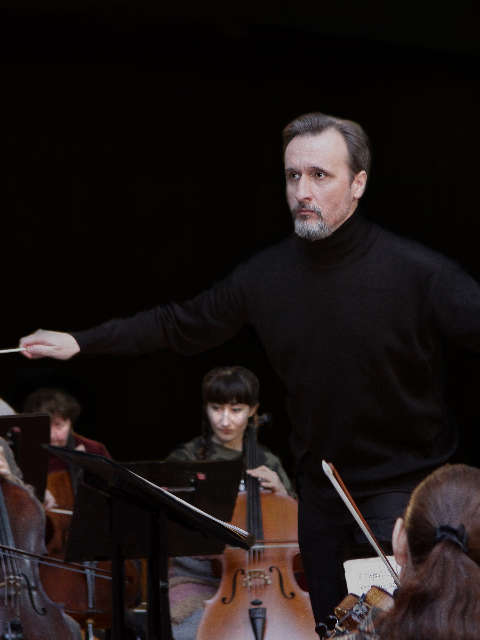"ORCHESTRAL SKETCHES OF A CONDUCTOR: VLADIMIR GORBIK"
June 15, 2017

On May 27, 2017 in the Great Hall of the Moscow Conservatory during the season-ending concert of the Choral School of the Moscow Representation Church of the Holy Trinity-Saint Sergius Lavra, the Capital Symphony Orchestra premiered under the direction of Vladimir Gorbik. The sudden appearance of this new ensemble on the Moscow scene was made possible through the combined efforts of not only Maestro Gorbik and his musicians, but also those of a full array of supporters and friends, including: Russian producers Alexei Gubarev and Natalya Korzun; US partner Dr. Nicholas Reeves; sound engineer and producer Seraphim Hanisch; and two soloists of Moscow-based opera company Helikon Opera, Mikhail Davydov and Pyotr Morozov. Already, conductors from across the globe have signed on to collaborate with the new orchestra, including Professor Neil McEwan of the Sydney Conservatory; Nikos Tsouxlos, Dean and Artistic Director of the Athens Conservatory Orchestra; and Anvar Raimdzhanov, Music Director of the Soloists of Uzbekistan chamber orchestra; as well as other notable musicians.
One may ask how a newly-founded orchestra, only 3 months old, has already come to garner professional status in such short order, attracting international attention and immediately booking concerts not only in Russia, but also in the US, the EU, and Australia. Among the symphony orchestra’s upcoming engagements under Vladimir Gorbik’s direction are a concert tour of Siberian cities and a concert series at a New York-area university. How, indeed, is this possible given the current Russian financial crisis?
In responding to these questions, the Maestro appeals, first of all, for spiritual help from a higher power, as he works as both a symphonic conductor and as the choirmaster of the Moscow Representation Church of the Holy Trinity-Saint Sergius Lavra. Diligence and perseverance, coupled with a keen talent for interpreting repertoire and for organization, have enabled him to survive and flourish through even the most difficult times. Actualizing his longtime dream, towards which he has labored for over 30 years, Vladimir Gorbik expresses heartfelt gratitude to the instrumental and choral conducting faculty of the Moscow Conservatory, whose experience and mentorship have contributed to the rapid emergence and successful development of the nascent orchestra.
The Maestro’s resume as an artist is also telling. The winner of two international conducting competitions, and a multi-instrumentalist, Vladimir Gorbik graduated with honors from the Moscow Conservatory in both Operatic-Orchestral and Choral Conducting in 2000, and has taught on the faculty of the Conservatory since 2012. He is well-known for his work as the Artistic Director and Co-Founder of the Patriarch Tikhon Russian American Music Institute (PaTRAM - PA, USA), where he serves as the principal conductor of the PaTRAM Choir, as well as for his engagements as guest conductor with the Uzbekistan National Symphony Orchestra and the Soloists of Uzbekistan chamber orchestra (Tashkent).
In recent years, Maestro Gorbik has also served as guest conductor and clinician for numerous master classes in the US, Canada, Australia, and Uzbekistan. His Moscow-based symphony orchestra came into being in March 2017. Currently, the orchestra is comprised of 60 musicians from Moscow’s best performing ensembles. From the first, the musicians’ playing has been marked by a high level of professionalism and a sincere desire to be part of the new venture.
According to Gorbik, the fundamental idea behind the orchestra is the performance of Russian and Western European classical and contemporary music, drawing on the tradition of past masters including Yevgeny Svetlanov, Herbert von Karajan, Bruno Walter, and the present-day conductors Vladimir Fedoseyev, Yuri Simonov, and Ricardo Muti. In its work, the orchestra prefers time-tested music and a traditional approach to performance, which must, by necessity, incorporate a spiritual imperative. Such a seemingly antiquated approach includes a special dynamic treatment of the spiritual legacy of the past. This approach could be compared to people reading the early Christian Fathers in order to correct their path in life and to learn to live in the world.
The Maestro’s teaching style is characterized by his use of spiritual examples, where appropriate. In their symphonic and choral work, conductors rarely speak in these terms, delving instead into the superficial levels of musical texture and form, with an overabundance of sound, often eliciting in the audience a sense of emptiness and an unbalanced interpretation. The musicians of his orchestra are drawn to the spiritual interaction, which is based on learning and love toward others. At the same time, both the choir and the orchestra, according to Gorbik, are two absolutely parallel projects in his life, which feed off each other, and which periodically intersect in concert. It could be said that the Maestro’s spiritual world is a constant crossroads of opportunities, eras, and continents. Fittingly, on May 27 in the Great Hall of the Moscow Conservatory, under the direction of Vladimir Gorbik, Bortniansky’s “Let God Arise,” Mozart’s “Dies irae,” and A. Pakhmutova and N. Dobronravov’s “Let Us Honor Those Great Years,” crossed paths in concert. The orchestra and the Combined Mixed Choir of the Moscow Representation Church of the Holy Trinity-Saint Sergius Lavra exited the stage to applause and shouts of “Bravo” from various ends of the hall. We believe the orchestra has a bright future ahead.
Timur Musayev
Candidate of Cultural Studies
Distinguished Fellow of the Moscow Musical Society
Translated by Serge Liberovsky

